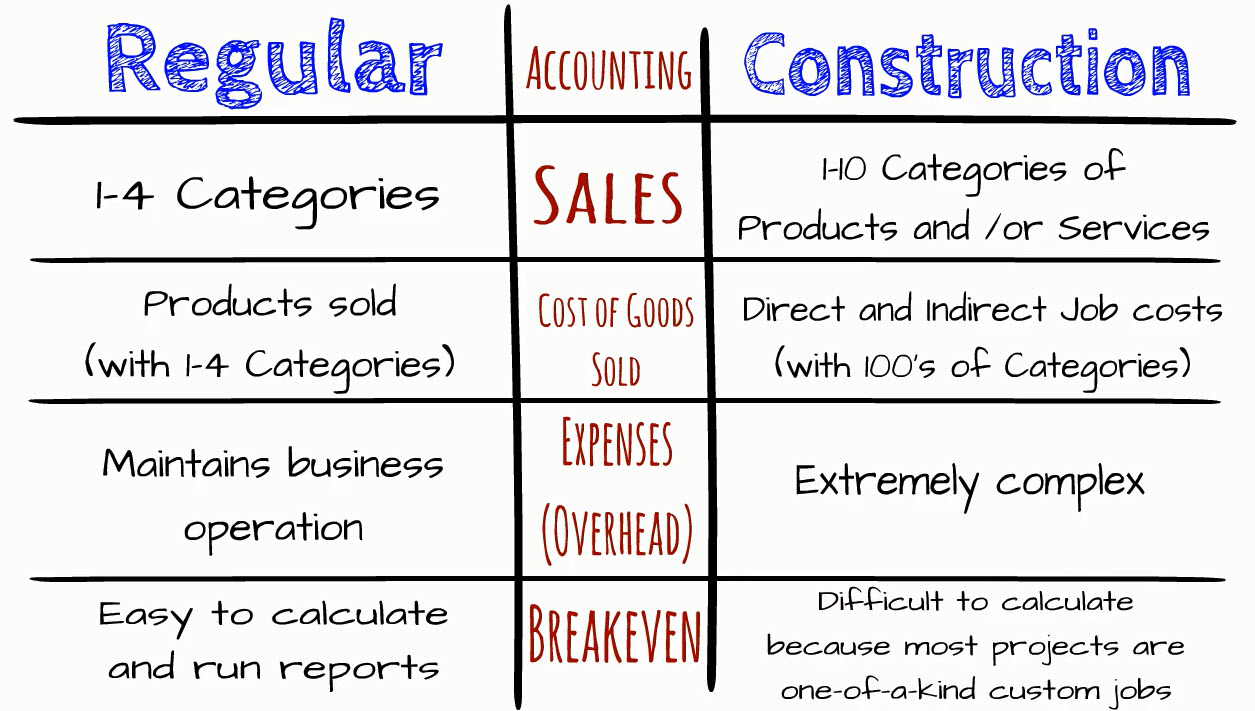Construction Accounting: Expert Solutions for Managing Project Budgets and Costs
Construction Accounting: Expert Solutions for Managing Project Budgets and Costs
Blog Article
Comprehending the Relevance of Building Audit for Successful Project Administration

Duty of Construction Accountancy
Building accountancy offers as the backbone of economic management in the building market, making certain that projects are completed within budget and monetary purposes are met. construction accounting. This specialized bookkeeping strategy addresses the unique challenges dealt with in building tasks, consisting of differing project durations, varying prices, and several stakeholders
Among the primary functions of building and construction accounting is to offer exact cost estimation and tracking throughout the project lifecycle. This promotes educated decision-making, allowing task supervisors to readjust sources and timelines successfully. Additionally, construction accounting enhances capital administration by keeping an eye on accounts payable and receivable, therefore making sure that funds are offered for timely settlements to subcontractors and suppliers.
It furnishes project managers with the required financial information to prepare in-depth monetary statements, which are essential for audits and economic testimonials. Inevitably, the duty of building audit expands past plain financial monitoring; it is essential to tactical planning and operational efficiency, driving the success of building and construction tasks in an affordable landscape.
Key Elements of Building And Construction Accounting

Budgeting establishes an economic framework that guides project execution, enabling managers to assign sources efficiently and prepare for potential monetary difficulties. Precise expense monitoring is vital for surveillance costs in real-time, helping to identify differences in between forecasted and actual expenses. This allows timely changes to keep the job on spending plan.
In addition, economic coverage supplies stakeholders with a clear photo of the task's financial wellness. Regular reports, such as revenue and loss statements and cash flow evaluations, facilitate educated decision-making and improve openness amongst all events included.
Furthermore, compliance with sector policies and accounting standards is vital. This makes certain that economic techniques are not only efficient but also authorized, securing the organization against legal repercussions. By integrating these crucial parts, building and construction bookkeeping cultivates an organized technique to taking care of funds, ultimately adding to the effective completion of construction tasks.
Benefits for Job Supervisors
Leveraging reliable building accountancy practices gives task supervisors with a wide range of benefits that enhance both functional performance and financial oversight. One substantial advantage is enhanced budget monitoring. Accurate monitoring of earnings and costs allows project managers to monitor economic efficiency in genuine time, making certain tasks remain within budget and facilitating prompt changes when necessary.
Moreover, construction accounting improves money flow management, enabling task managers to expect economic needs and enhance source allotment. By comprehending money inflows and outflows, they can better handle repayments to subcontractors, staff members, and suppliers, thereby avoiding pricey delays.
Additionally, robust accounting systems offer detailed coverage abilities. Job managers can create records that use understandings into project success, cost variations, and source utilization. This data-driven method fosters informed decision-making, permitting managers to determine potential issues proactively and carry out corrective steps.
Finally, adherence to building accounting requirements ensures compliance with regulative and legal needs, minimizing the threat of conflicts or charges. In general, efficient construction accounting outfits project managers with the tools necessary to drive task success, enhance stakeholder self-confidence, and promote lasting business growth.
Usual Challenges in Construction Accountancy
Numerous task supervisors encounter considerable challenges in building audit that can prevent job success. Among the primary obstacles is the intricacy of tracking numerous job sites, each with distinct spending plans, timelines, and resource allowances. This calls for precise focus to information, which can be frustrating without a robust accountancy system in position.
Additionally, rising and fall product expenses and labor prices can complicate spending plan management, making accurate projecting challenging. Project managers typically have a hard time to reconcile these prices with real expenditures, bring about prospective financial discrepancies.
Moreover, construction audit includes compliance with various regulations, consisting of tax responsibilities and labor regulations. Navigating these regulations can be overwhelming, especially for supervisors website here that may not have a solid bookkeeping background.
One more substantial difficulty is taking care of capital, which is vital in the construction market. Hold-ups in invoicing, repayments from clients, or unanticipated project adjustments can create money flow lacks, jeopardizing the job's progression.
Finally, reliable communication between task supervisors, accounting professionals, and field teams is essential. Misunderstandings can result in imprecise economic coverage, even more making complex task monitoring efforts. Attending to these difficulties proactively is essential for effective building and construction accountancy.

Best Practices for Effective Audit
While browsing the intricacies of building and construction bookkeeping can be challenging, adopting best methods can considerably boost economic monitoring and project success. One basic method is keeping exact and prompt records. Implementing durable accountancy software customized to construction projects can streamline data entrance, invoicing, and coverage, saving and minimizing errors time.
Furthermore, establishing a clear budget and routine surveillance against this spending plan are critical. Employing a system of regular economic testimonials permits task managers to determine variations early, promoting prompt decision-making. It is likewise necessary to separate task prices right into indirect and straight classifications, enabling clearer understandings into earnings.
An additional ideal technique entails promoting open communication among all stakeholders. Normal updates and collaborative discussions concerning monetary condition can make certain everyone is straightened and educated. Training staff in construction-specific accounting principles even more improves competency and precision.
Lastly, this article ensuring conformity with pertinent accountancy criteria and policies is non-negotiable. Regular audits and inner reviews add to transparency and accountability, building trust fund with clients and stakeholders. By focusing on these finest methods, building companies can maximize their accounting procedures, eventually driving job success and financial stability.
Final Thought
To conclude, construction audit plays a crucial duty in ensuring effective task monitoring by promoting exact monetary oversight and improving decision-making. By incorporating crucial parts such as expense estimation, cash circulation management, and conformity, project supervisors can browse common difficulties and take advantage of best methods for efficient accountancy. Ultimately, a robust building and construction accounting structure not only safeguards spending plan stability however also adds to the general explanation monetary wellness of building and construction tasks, promoting lasting success within the sector.
By integrating these crucial elements, building bookkeeping fosters a structured technique to handling financial sources, inevitably contributing to the successful completion of construction tasks.
Precise monitoring of revenues and costs permits task supervisors to keep an eye on monetary performance in real time, ensuring jobs remain within budget plan and promoting timely modifications when necessary.
Job supervisors can create reports that use insights into job profitability, price variations, and source usage.Lots of project supervisors come across significant difficulties in building bookkeeping that can hinder task success. construction accounting. Eventually, a durable building audit framework not only safeguards budget plan stability but additionally contributes to the overall monetary wellness of building tasks, promoting lasting success within the industry
Report this page